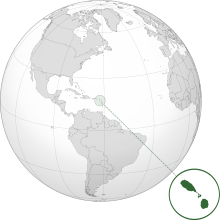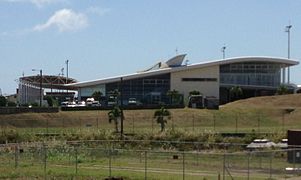
Anguilla is a British Overseas Territory in the Caribbean. It is one of the most northerly of the Leeward Islands in the Lesser Antilles, lying east of Puerto Rico and the Virgin Islands and directly north of Saint Martin. The territory consists of the main island of Anguilla, approximately 16 miles long by 3 miles (5 km) wide at its widest point, together with a number of much smaller islands and cays with no permanent population. The territory's capital is The Valley. The total land area of the territory is 35 square miles (91 km2), with a population of approximately 15,753 (2021).

The economy of Jamaica is heavily reliant on services, accounting for 70% of the country's GDP. Jamaica has natural resources and a climate conducive to agriculture and tourism. The discovery of bauxite in the 1940s and the subsequent establishment of the bauxite-alumina industry shifted Jamaica's economy from sugar, and bananas.

Nevis is a small island in the Caribbean Sea that forms part of the inner arc of the Leeward Islands chain of the West Indies. Nevis and the neighbouring island of Saint Kitts constitute one country: the Federation of Saint Kitts and Nevis. Nevis is located near the northern end of the Lesser Antilles archipelago, about 350 kilometres (220 mi) east-southeast of Puerto Rico and 80 kilometres (50 mi) west of Antigua. Its area is 93 square kilometres (36 sq mi) and the capital is Charlestown.

Saint Kitts and Nevis, officially the Federation of Saint Christopher and Nevis, is an island country in the West Indies. Located in the Leeward Islands chain of the Lesser Antilles, it is the smallest sovereign state in the Western Hemisphere, in both area and population, as well as the world's smallest sovereign federation. The country is a Commonwealth realm, with Charles III as King and head of state. It is the only sovereign federation in the Caribbean.
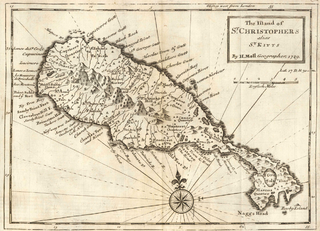
Saint Kitts and Nevis have one of the longest written histories in the Caribbean, both islands being among Spain's and England's first colonies in the archipelago. Despite being only two miles apart and quite diminutive in size, Saint Kitts and Nevis were widely recognized as being separate entities with distinct identities until they were forcibly united in the late 19th century.
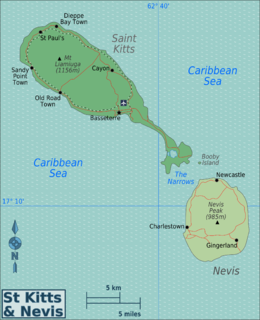
Saint Kitts, officially the Saint Christopher Island, is an island in the West Indies. The west side of the island borders the Caribbean Sea, and the eastern coast faces the Atlantic Ocean. Saint Kitts and the neighbouring island of Nevis constitute one country: the Federation of Saint Kitts and Nevis. Saint Kitts and Nevis are separated by a shallow 3-kilometre (2 mi) channel known as "The Narrows".
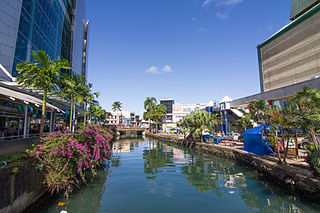
The economy of Fiji is one of the most developed among the Pacific islands. Nevertheless, Fiji is a developing country endowed with forest, mineral and fish resources. The country has a large agriculture sector heavily based on subsistence agriculture. Sugar exports and the tourism industry are the main sources of foreign exchange. There are also light manufacturing and mining sectors.

Basseterre is the capital and largest city of Saint Kitts and Nevis with an estimated population of 14,000 in 2018. Geographically, the Basseterre port is located at 17°18′N62°44′W, on the south western coast of Saint Kitts Island, and it is one of the chief commercial depots of the Leeward Islands. The city lies within Saint George Basseterre Parish.
The economy of Saint Kitts and Nevis has traditionally depended on the growing and processing of sugar cane; decreasing world prices have hurt the industry in recent years. Tourism, export-oriented manufacturing, and offshore banking activity have assumed larger roles in Saint Kitts and Nevis. Most food is imported. The government has undertaken a program designed to revitalize the faltering sugar sector. It is also working to improve revenue collection in order to better fund social programs. In 1997, some leaders in Nevis were urging separation from Saint Kitts on the basis that Nevis was paying far more in taxes than it was receiving in government services, but the vote on cessation failed in August 1998. In late September 1998, Hurricane Georges caused approximately $445 million in damages and limited GDP growth for the year.

Since the island country's independence in 1966, the economy of Barbados has been transformed from a low-income economy dependent upon sugar production into a high-income economy based on tourism and the offshore sector. Barbados went into a deep recession in the 1990s after 3 years of steady decline brought on by fundamental macroeconomic imbalances. After a painful re-adjustment process, the economy began to grow again in 1993. Growth rates have averaged between 3%–5% since then. The country's three main economic drivers are: tourism, the international business sector, and foreign direct-investment. These are supported in part by Barbados operating as a service-driven economy and an international business centre.

The Saint Kitts and Nevis Defence Force is the military of Saint Kitts and Nevis. It currently consists of an infantry unit and a maritime unit. Both units having regular and reserve elements, all under the command Force Headquarters. The current Commander of the SKNDF is Major J. Anthony Comrie. The SKNDF has an active force of 300 personnel with a corps of 150 cadets.

Saint George Basseterre is one of 14 administrative parishes that make up Saint Kitts and Nevis. It is the largest parish on Saint Kitts and the second largest parish in Saint Kitts and Nevis. It is by far the most populous parish in the federation, holding nearly a third of the country's population. It is home to the city of Basseterre, capital of Saint Kitts and Nevis, and also has a longer coastline than any other parish in Saint Kitts and Nevis.
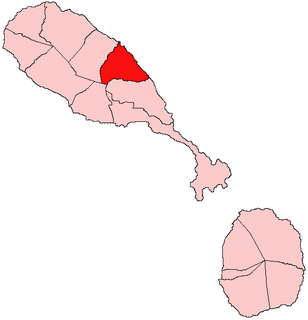
Saint Mary Cayon is one of 14 administrative parishes that make up Saint Kitts and Nevis. It is located on the main island of Saint Kitts and the parish capital is Cayon.
The 'Economy of the Caribbean' is varied, but depends heavily on natural resources, agriculture and travel and tourism.

The following outline is provided as an overview of and topical guide to Saint Kitts and Nevis:
A series of workplace disturbances, strikes, and riots broke out across the British West Indies in the period between 1934 and 1939. These began as the Great Depression wore on and ceased on the eve of World War II. The unrest served to highlight inequalities of wealth, led the British government to attempt a solution to the problem, and in some cases spurred the development of indigenous party politics that would lead to self-government and independence in the postwar period.
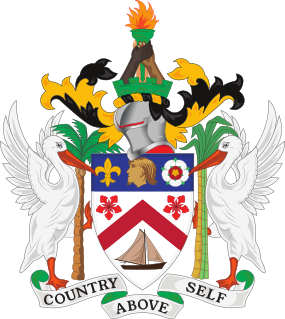
The primary law governing Saint Kitts and Nevis nationality regulations is the Saint Christopher and Nevis Citizenship Act, which came into force on 28 February 1984.
